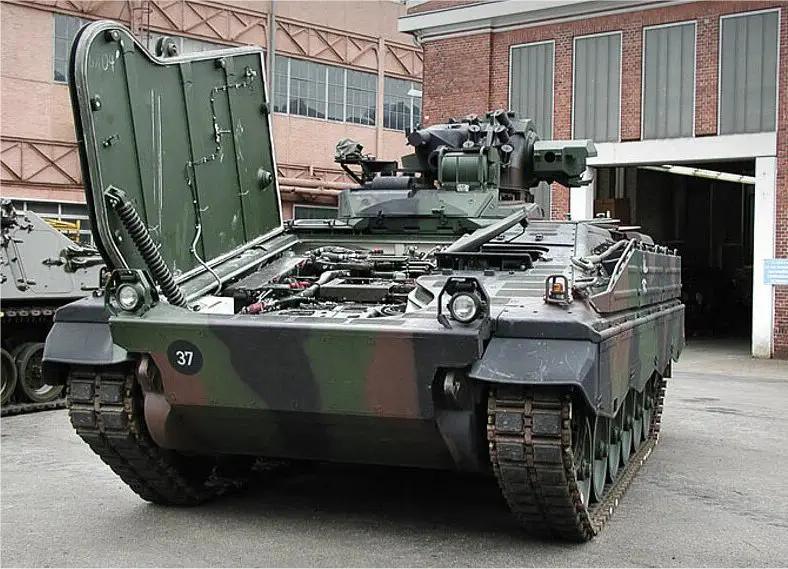Breaking news
Rheinmetall to Build Armored Vehicles Workshop in Ukraine.
On July 10, 2023, Rheinmetall's CEO, Armin Papperger, announced during an interview on CNN that the company plans to build a production facility in Ukraine to help the country achieve military independence. The goal is to provide Ukraine with NATO technology and production capabilities to support its own armed forces and reduce reliance on external aid, including from the United States and the European Union.
Follow Army Recognition on Google News at this link

Rheinmetall plans to build a workshop on Ukraine territory. (Picture source FNSS)
Rheinmetall's CEO, Armin Papperge, emphasized that one of Ukraine's main challenges is the shortage of ammunition. With one of the world's highest capacities for producing tank shells, Rheinmetall is already contributing significantly by supplying substantial quantities. The company is prepared to establish factories in Ukraine to further increase production and meet the country's needs.
In the coming months, Rheinmetall plans to open a workshop in Western Ukraine where Ukrainians can maintain their military vehicles provided by NATO countries. Regarding production location, Rheinmetall is considering starting with the manufacturing of armored personnel carriers using Fuchs/Fox technology, highlighting that their 6X6 vehicles would be excellent for the Ukrainian army. The company is also ready to supply Marder tracks (10 per month) and Leopard 2A4 tanks to Ukraine, as they already do for the Ukrainian army.
Rheinmetall's ambitious plan is to transfer 250 vehicles to Ukraine within the next 12 months. However, the main concern remains the shortage of ammunition. Rheinmetall positions itself as the world's leading manufacturer of tank shells, currently producing between 150,000 and 240,000 shells per year. The company's commitment primarily lies in increasing artillery shell production, which plays a crucial role in Ukraine's war efforts, from 100,000 to 600,000.
The Rheinmetall plant in Ukraine could also produce a range of armored vehicles in the long run, providing Ukraine with increased capability to counter modern Russian tanks. Among the considered vehicles is the German KF-51 Panther, a highly modern tank potentially capable of outperforming the latest Russian tanks. The Panther is renowned for its mobility, advanced ballistic protection, and sophisticated weapon systems.
The KF-51 Panther represents a new concept of a main battle tank in terms of lethality, protection, reconnaissance, networking, and mobility. It incorporates new combat technologies and innovations, being fully defined by software. Thanks to its advanced, modular, and open NGVA (NATO Generic Vehicle Architecture) design, the KF-51 can be easily updated and equipped with the latest capabilities and functions.
Additionally, Rheinmetall might consider the production of a more cost-effective tank, the Ukrainian-designed T-84 Oplot. Although less advanced than the Panther, the T-84 Oplot is a powerful tank capable of matching Russian tanks. It is appreciated for its reliability, firepower, and impact resistance. These vehicles would be particularly well-suited to confront Russian tanks due to their advanced technical characteristics. The Panther, with its innovative design and cutting-edge systems, can provide tactical superiority on the battlefield, while the T-84 Oplot offers a balanced combination of firepower, mobility, and protection.
The situation in Ukraine has become increasingly concerning, with Russia strengthening its capacity to produce modern tanks while Ukraine still heavily relies on equipment transfers from its Western allies. Although the percentage of vehicle losses, including tanks, is higher for Russian ground forces, Russia has mobilized its production capacities to replace and increase its fleet of armored vehicles. Primarily, they include the T-72B3M, T-80BVM, and T-90M tanks, which possess enhanced capabilities in terms of firepower, protection, and mobility. Ukraine, on the other hand, heavily depends on the support provided by NATO member states and limited supplies.
The decision by Rheinmetall to build a factory in Ukraine has not been without controversy. Some experts have expressed concerns about the factory's security, highlighting that it could be a target for Russian strikes. Nevertheless, Rheinmetall and its Ukrainian partner, Ukroboronprom, appear determined to see this project through, with operations expected to begin by the end of September.
The establishment of an armored vehicle production plant in Ukraine by Rheinmetall presents a transformative opportunity for the country. By providing access to cutting-edge technology and fostering knowledge transfer, this partnership has the potential to elevate Ukraine's military capabilities and strengthen its indigenous defense industry. As the project moves forward, it signifies not only a significant investment in Ukraine's defense but also a testament to the enduring friendship and collaboration between Germany and Ukraine in the pursuit of a more secure and self-reliant future.


























